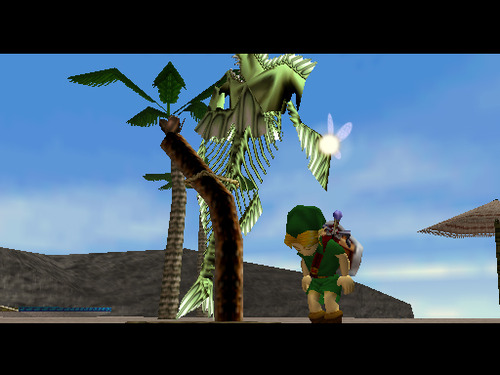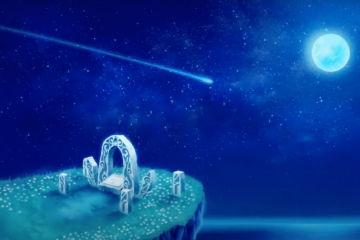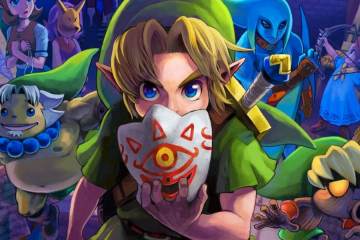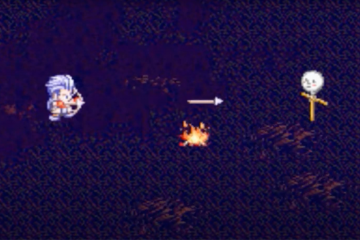I’ve grown up with Zelda Games. I first played Ocarina of Time when I was three years old, and my brother and I bought Majora’s Mask on the day it came out. But, embarrassingly, I never actually played it. Back in those days, when I was but six, I could play the first hour and a half of the game before I became unnerved and afraid by the ominous world and the daunting moon and inevitably completely freaked out and stopped playing. So it makes sense that as the wave of pessimistic, existential interpretations of Majora started coming out, I thought they were right on the money. The GameTheorists on Youtube really seemed to have a point in mentioning that Termina is a massive metaphor for grief. The darkness of the game seemed to open it up to in-depth analysis.
But since the re-release this last February, I’ve finally had the opportunity to play it. And what I’ve discovered is not a game shrouded in pessimism and hopelessness, but rather a game with constant messages of hopefulness and beauty in the face of despair and moments where Link must literally watch a character die in front of him. The Game Theorists’ theory that the world of Majora’s Mask is a metaphor for grief, simply doesn’t explain the strange positivity, and lack of grief involved in actually witnessing the deaths in the game. In the macrocosm they have a strong argument, but by looking more closely at the game in terms of discrete moments and mechanics, the game does not appear to be analyzing grief. The game expresses the amazing ability for the living to carry on the memory of the dead, and also for the dying to pass on something of true value to the living—it’s a celebration of reaching adulthood and picking up where the previous generation left off.
That’s a lot to swallow right there, so let’s back up a little bit. The moment we’re going to examine here is the death of Mikau at Great Bay. He is found floating in the water, near death. So you push him back to shore, and then he bids you to listen to his story. He tells you that as he is, he can’t die in peace, and asks you to heal his soul. You do this (that’s another topic in and of itself), and he vanishes. This leaves behind a mask, carrying his soul. And you find out that you can put on this mask, and embody the spirit of Mikau. Then he asks you to build him a grave and accomplish his finals goals, which he was unable to achieve. “Carve my farewell song on my grave…” he bids you. So you build him a grave.
The concept of the grave is key here. Link does build Mikau a literal grave—that is a physical monument to the deceased—but the magic of the game comes from the player’s ability to create a living memorial for the dead—a sovereign entity capable of living on for the dead inside the world of the game.

So, why does this happen? That’s the right question to ask. In order to answer this question, we must take a moment to examine the concept of silence, both because Link himself is silent in a non-silent world, and because silence is essential in the creation of action and experience.
Video games are a new medium that provides fascinating rhetorical and narratological possibilities, because you, the player, can, through your avatar, have an effect on the universe and the story that you inhabit in the game. This sovereign capability that one has in a game is, I’d argue, the single most important power that video games have added to the human race’s ability to tell stories. Making the avatar in a game silent only purifies this connection. As With a Terrible Fate mentioned in a previous article, Link is “much less a character than he is a conduit.” That is to say he is simply a point of entrance for the player into the game, and not really a character and of himself. But there’s complexity here. In the words of video game scholar, Robin Jansson, “by silencing the protagonist, you can allow the player to decide for themselves who the character really is.” Not only then is Link a point of entrance, but he is a character defined by the player. The player can define an existence within the world of the game.
But the ability I just described is empty if there is no reason to create a particular existence. And to me, this is largely the measure of what differentiates a bad game from a good one. The difference is your (the player’s) ability to make a meaningful change in the game world. To do this, two things are necessary—motivation, and capacity. So in order to explain why Mikau’s death is so powerful in Majora’s Mask, we must explain both what your motivation is to act, and how you can do so.
Silence can explain the motivation to action in this case. Since Link doesn’t speak, this forces the player to truly consider and reflect upon the death that occurs before them. As is explained by another author, Peter Ehrenhaus, especially poignant silent encounters “provide the opportunity for ‘taking hold’ and gaining insight” and even gaining greater self-awareness. Link doesn’t do your grieving for you. He doesn’t tell you what to do. He doesn’t tell you what to think. You’re provided with a situation and must figure out how to act. This is your motivation—make sense of the emptiness and pointlessness of the death that you have just encountered.
So what do we do? What can we do? Though the death that has been encountered is virtual, it still begs for action. But what capacity do we have? The player is left with two options in this case:
- Do nothing. Stop playing, and never settle the issue.
- Continue playing, and by doing something in the game, honor the deceased and live for them.
This second option allows for one of the single most masterfully executed games in history to really shine. Each time that a character dies in Majora’s Mask, they ask you to accomplish what they could not—to heal their spirit and let them know that though they are gone, they accomplished their goals and left behind a better world. And then they leave behind a mask.
Link can put on a mask and take on the form of the spirit contained within the mask. This is the player’s capacity. This is what s/he can do to change the world in which s/he exists.
But there’s even one further level here. When Link puts on a mask, he is basically doing the same thing the player is doing—he is becoming the avatar of the game. In this way, by choosing to put on the mask, the player has redefined Link.
The player has made Link into a living monument for the deceased. They have created an undeniable capacity for the dead not to have died in vain.
In this picture here, there is there a literal grave memorializing the dead. But, more importantly, Link, the player him or herself, is a living monument for the dead. This is optimism in the face of despair.




